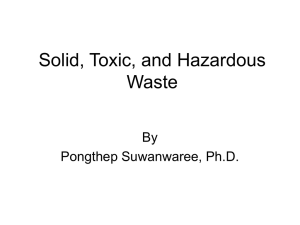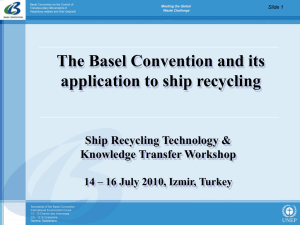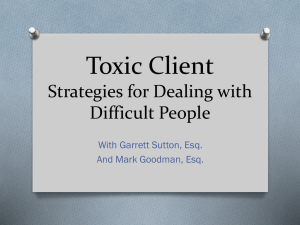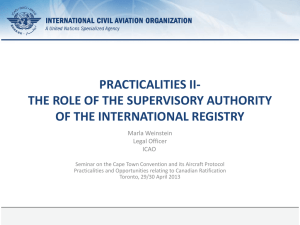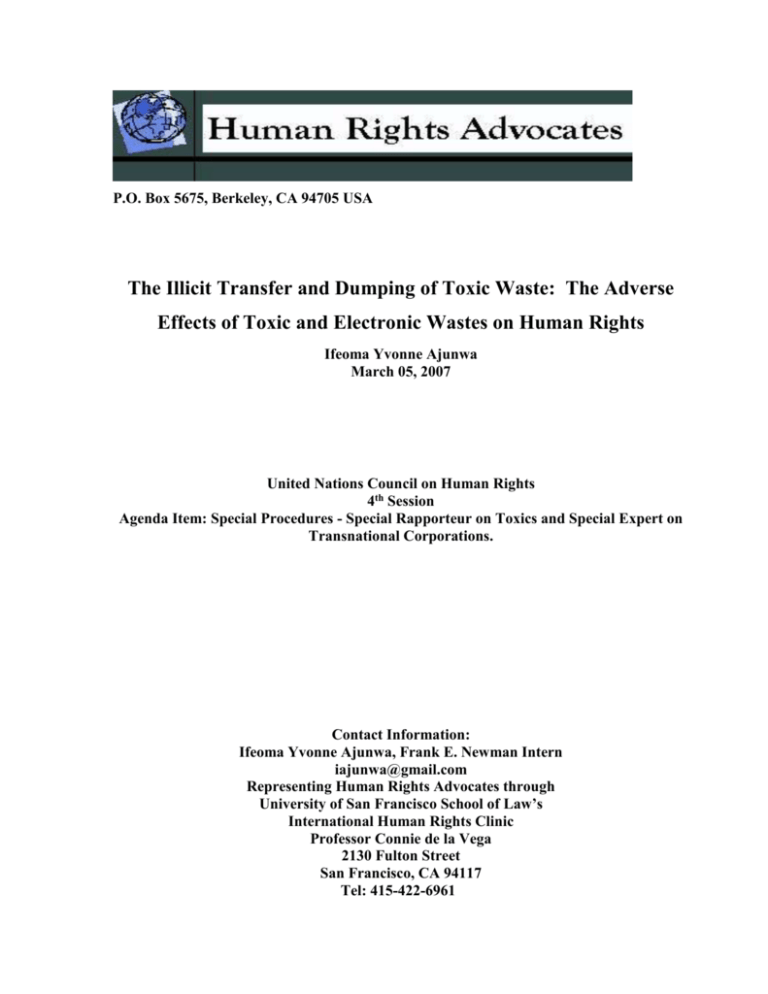
P.O. Box 5675, Berkeley, CA 94705 USA
The Illicit Transfer and Dumping of Toxic Waste: The Adverse
Effects of Toxic and Electronic Wastes on Human Rights
Ifeoma Yvonne Ajunwa
March 05, 2007
United Nations Council on Human Rights
4th Session
Agenda Item: Special Procedures - Special Rapporteur on Toxics and Special Expert on
Transnational Corporations.
Contact Information:
Ifeoma Yvonne Ajunwa, Frank E. Newman Intern
iajunwa@gmail.com
Representing Human Rights Advocates through
University of San Francisco School of Law’s
International Human Rights Clinic
Professor Connie de la Vega
2130 Fulton Street
San Francisco, CA 94117
Tel: 415-422-6961
Ifeoma Ajunwa, Human Rights Advocates Representative
Report to 4th Session of the United Nations Human Rights Council
I.
Introduction
There is no question that there is an imbalance of wealth in the world. More
wealth leads to more consumption and ultimately to more waste. The United States
Environmental Protection Agency reports that in 1999 alone, over 20,000 toxic waste
generators produced more than 40 million tons of toxic waste in the United States.1 The
European Commission reports that each year the European Union accumulates 1.3 billion
tons of waste, of which about 40 million tons is hazardous.2 With each nation possessing
finite space, a problem arises from the need to dispose of waste; this problem becomes
more acute when the waste is hazardous. While arguably it is just that richer populations
share their wealth with less fortunate countries, few would see the fairness in richer
populations sharing their waste. This is especially true when such sharing of waste
products is hazardous to the health of poorer populations. The sad reality, however, is
that as consumption increases in developed countries, less developed countries (LDCs)
are obliged to bear the brunt of the waste. For example, China alone imported 3 million
tons of plastic waste in 2003.3
This report focuses on two issues concerning the disposal of hazardous waste.
First, the report investigates the effects and causes of the illicit transfer and dumping of
toxic waste. Although the report observes that governments and corporations are both
culpable, research indicates that most violations are by multinational corporations.
Second, the report makes recommendations as to the best mechanisms to stem the
1
Frequently Asked Questions About Waste, U.S. Environmental Protection Agency,
http://www.epa.gov/epaoswer/osw/basifact.htm.
2
European Commission, “Waste” last updated 06/14/2006,
http://ec.europa.eu/environment/waste/index.htm.
3
“China revises law -- doesn't want to be "world's largest dumping ground.” People's Daily Online,
November 4, 2004, http://www.ban.org/ban_news/2004/041104_china_revises.html.
1
Ifeoma Ajunwa, Human Rights Advocates Representative
Report to 4th Session of the United Nations Human Rights Council
problem. Particularly, research has shown that existing legal instruments against the
illicit transfer of toxics is lacking in enforcement and effectiveness. The report also notes
that in addition to the governments of the member states entering into multi-lateral
environment agreements, there is a greater need for corporate accountability.
Although the illegal action of a private entity usually may not legally be imputed
to the State, at least one human rights body has found circumstances under which a State
may be held responsible. The Inter-American Commission on Human Rights (IACHR)
found: “the State will incur responsibility for the illegal acts of private actors when it has
permitted such acts to take place without taking adequate measures to prevent them or
subsequently to punish the perpetrators.”4 Even if multinational corporations operate
inter-continentally, the fact remains that they are incorporated under the laws of a single
State and thus may be regulated by the laws of that State. Thus, individual States should
be held responsible for ensuring that corporations within their jurisdiction do not engage
in practices that result in human right violations.
II.
The International Legal Community’s Focus on Hazardous or Toxic waste
A. Definition of toxic waste
Toxic waste is defined as waste material that can cause death or injury to living
creatures. This waste is produced from industry or commerce, but is also derived from
residential use, agriculture, the military, medical facilities and radioactive sources. The
term is often used interchangeably with “hazardous waste,” or discarded material that can
pose a long-term risk to health or environment. Toxics can be released into air, water, or
4
Inter-American Commission on Human Rights (IACHR), Third Report on the Human Rights Situation in
Colombia at 1-8, O.A.S. Doc. OEA/Ser.L/V/II.102, doc. 9 rev. 1 (1999).
2
Ifeoma Ajunwa, Human Rights Advocates Representative
Report to 4th Session of the United Nations Human Rights Council
land.5 Some examples of toxic waste include chemical waste, medical or pharmaceutical
waste, and electronic waste (“e-waste”) which includes discarded computers and other
electronic devices that contain highly toxic chemicals such as lead and mercury.
B. International Legal Instruments on the Environment
As toxic waste degrades the environment, it also impacts the human right to a
healthy environment. The Stockholm Declaration, adopted on June 16, 1972 is the first
document in international environmental law to explicitly recognize the right to a healthy
environment.6 Principle 1 of the Stockholm Declaration states: “Man has the
fundamental right to freedom, equality and adequate conditions of life, in an environment
of a quality that permits a life of dignity and well-being . . .”7 Prior to that, the Universal
Declaration of Human Rights Article 25 affirmed that: “Everyone has the right to a
standard of living adequate for the health and well-being of himself and of his family,
including food, clothing, housing . . .”8 The International Covenant on Economic, Social
and Cultural Rights Article 11 further states: “The States Parties to the present Covenant
recognize the right of everyone to an adequate standard of living for himself and his
family, including adequate food, clothing and housing...”9 The right to housing is
affected by the illicit dumping of toxic waste which renders the environs of the dump site
uninhabitable.
5
The Columbia Electronic Encyclopedia, Sixth Edition Copyright © 2003, Columbia University Press.
Licensed from Columbia University Press. All rights reserved, http://www.cc.columbia.edu/cu/cup/
6
Declaration of the United Nations Conference on the Human Environment (Stockholm, June 5-16, 1972),
http://www.unep.org/Documents.multilingual/Default.asp?DocumentID=97&ArticleID=1503.
7
Id.
8
Universal Declaration of Human Rights, adopted and proclaimed by General Assembly resolution 217 A
(III) of 10 December 1948, http://www.un.org/Overview/rights.html.
9
International Covenant on Economic, Social and Cultural Rights adopted by General Assembly
resolution 2200A (XXI) of 16 December 1966, entry into force 3 January 1976, in accordance with article
27, http://www.unhchr.ch/html/menu3/b/a_cescr.htm.
3
Ifeoma Ajunwa, Human Rights Advocates Representative
Report to 4th Session of the United Nations Human Rights Council
Further the State Parties stipulated that: “…all beneficiaries of the right to
adequate housing should have sustainable access to natural and common resources, safe
drinking water...”10 As improperly dumped toxic waste leaches into the soil and
groundwater of the site where it is dumped, the illicit transfer and dumping of toxic waste
does have a negative impact on the right to safe drinking water. Finally, the United
Nations General Assembly has stressed the need to ensure a healthy environment for the
well-being of individuals.11 The operative paragraph of the resolution reads “all
individuals are entitled to live in an environment adequate for their health and wellbeing.”12 Various reports show that the dumping of toxic waste without the correct
precautions results in harm to the environment and to the health of human beings.
Several Multi-lateral Environmental Agreements (MEAs) have been enacted to
address the international transfer of waste, toxics and chemicals. Few of them, however,
focus on the human rights implications of the illicit transfer of toxics and wastes. The
Aarhus Convention is an exception as it allows individuals to demand information
sharing on projects or industries that affect the environment or human rights.13 Entered
into force by the European Union and other States, the Aarhus convention is, however,
limited in its power to hold private corporations accountable as only public authorities are
required to provide information.
10
The right to adequate housing (Art.11 (1)): 13/12/91. CESCR GENERAL COMMENT 4 The right to
adequate housing (Art. 11 (1) of the Covenant) (Sixth session, 1991),
http://www.unhchr.ch/tbs/doc.nsf/(symbol)/CESCR+General+comment+4.En?OpenDocument.
11
General Assembly Resolution 45/94 (1990): Need to ensure a healthy environment for the well-being of
individuals. http://www.un.org/documents/ga/res/45/a45r094.htm.
12
Id.
13
United Nations Economic Commission for Europe Convention on Access to Information, Public
Participation in Decision-making and access to Justice in Environmental Matters, done at Aarhus,
Denmark, 25 June 1998, http://www.unece.org/env/pp/documents/cep43e.pdf.
4
Ifeoma Ajunwa, Human Rights Advocates Representative
Report to 4th Session of the United Nations Human Rights Council
The Basel Convention on the Control of Transboundary Movements of Hazardous
Wastes and Their Disposal is an international treaty that was entered into force on March
22, 1989 and is designed to prevent transfers of hazardous waste from developed to less
developed countries (LDCs).14 Among the Convention’s important objectives are: the
curtailment of the amount and toxicity of wastes generated, the regulation of the
management of waste from the source of generation in as environmentally-sound manner
as possible, and the assistance of LDCs in environmentally-sound disposal of the
hazardous wastes they generate or receive. Although entered into by 169 countries
including most European countries, the United States has yet to ratify the Convention.15
A major limitation of the Basel Convention is that it did not prohibit waste
exports to any location except Antarctica. Also, as a prerequisite for exports, the
Convention merely required a notification and consent system known as "prior informed
consent" or PIC.16
And as there was no ban on the exportation of recyclables, many
waste traffickers exploited this loop-hole. The Basel Ban Amendment to the Basel
Convention (which has not yet entered into force) is the only proposed mechanism for
closing the loop-holes in the Basel Convention. The Basel Ban prohibits the export of
hazardous waste from 29 of the wealthiest developed countries to developing countries.17
This would apply to all exports including those for the purpose of recycling. Thus, the
Basel Ban would be of major assistance in addressing the mounting e-waste problem in
the continents of Africa and Asia. Although the Ban Amendment has been signed by 63
14
The Basel Convention on the Control of Transboundary Movements of Hazardous Wastes and Their
Disposal, http://www.basel.int/text/con-e-rev.pdf.
15
Secretariat of the Basel Convention, United Nations Environment Programme “Parties to the Basel
Convention,” http://www.basel.int/ratif/frsetmain.php.
16
The Basel Convention on the Control of Transboundary Movements of Hazardous Wastes and Their
Disposal, http://www.basel.int/text/con-e-rev.pdf.
17
The Basel Action Network, “What is the Basel Ban?,
http://www.ban.org/about_basel_ban/what_is_basel_ban.html.
5
Ifeoma Ajunwa, Human Rights Advocates Representative
Report to 4th Session of the United Nations Human Rights Council
members, it is strenuously opposed by a number of industry groups as well as nations and
has not been ratified by the United States and Canada.18 The European Union fully
implemented the Basel Ban in its E-Waste Shipment Regulation (EWSR), making it
legally binding in all EU member states.
Regional treaties involving the transfer of toxics have been formed in adverselyaffected parts of the world. The Bamako Convention on the Ban on the Import into
Africa and the Control of Transboundary Movement and Management of Hazardous
Wastes within Africa was adopted in1991. Entered into force by 20 of the 36 members
of the Organization for African Unity (OAU) in 1991, the fundamental intent of the
Convention is to raise awareness of the “risk of damage to human health and the
environment caused by transboundary movements of hazardous wastes.” In Article 9 of
the Bamako Convention, “illegal” transfer of waste is defined as the “deliberate disposal
of hazardous waste in contravention of this Convention and of general principles of
international law.”19
The Bamako Convention was prompted by the failure of the Basel Convention to
prohibit trade of hazardous waste to LDCs, and from the realization that many developed
nations were exporting toxic wastes to Africa. An incident in Koko, Nigeria in 1987 is
believed to be the spur for the Bamako Convention. Italian businessmen Gianfranco
Raffaeli and Renato Pent, of the waste broker firms Ecomar and Jelly Wax respectively,
entered into an illegal contract with Nigerian businessman, Sunday Nana, to use his
18
Secretariat of the Basel Convention, United Nations Environment Programme, Ban Amendment to the
Basel Convention on the Control of Transboundary Movements of Hazardous Wastes and their
DisposalGeneva, 22 September 1995, ratifications, http://www.basel.int/ratif/frsetmain.php.
19
Bamako Convention on the Ban of the Import Into Africa and the Control of Transboundary Movement
and Management of Hazardous Wastes Within Africa. Organization of African Unity (OAU), January 30,
1991, http://www.ban.org/Library/bamako_treaty.html.
6
Ifeoma Ajunwa, Human Rights Advocates Representative
Report to 4th Session of the United Nations Human Rights Council
property for storage of 18,000 drums of hazardous waste (polychlorinated biphenyls and
dioxin) for approximately $100 a month.20 After the waste leaked from the barrels, the
many workers employed in the clean-up were hospitalized with chemical burns, nausea,
paralysis and coma. The seven premature births that occurred within the time period
were also attributed to the high toxicity of the dumpsite.21 Although the Bamako
Convention uses a format and language similar to that of the Basel Convention, it is much
stronger in prohibiting all imports of hazardous waste, and in not making exceptions (like
those for radioactive materials) made by the Basel Convention.
C. The role of the Special Rapporteur
The Commission appointed a Special Rapporteur in 1995 to study the adverse
effects of the illicit movement of toxic wastes on the enjoyment of human rights. The
United Nations Commission on Human Rights has determined that toxic waste affects the
human right to health, both physical and mental, and the human rights to clean water,
food, adequate housing and work.22 The Commission has also affirmed that illicit traffic
in and dumping of toxic wastes constitute “a serious threat to the right to life and the
enjoyment of the highest attainable standard of physical and mental health and other
human rights . . . particularly of individual developing countries that do not have the
technologies to process them.”23
The mandate of the Special Rapporteur is crucial to addressing this growing
problem. This report calls for the scope of the mandate of the Special Rapporteur on
20
Nigerian Waste Imports from Italy, http://www.american.edu/TED/nigeria.htm.
Greenpeace International. (1991). Greenpeace waste trade update, 4 (1).
22
Commission on Human Rights, Report on the 61st Session, 14 March -22 April 2005, resolution 2005/15,
“Adverse effects of the illicit movement and dumping of toxic and dangerous products and wastes on the
enjoyment of human rights,” http://www.ohchr.org/english/bodies/chr/docs/61chr/reportCHR61.pdf.
23
Id.
21
7
Ifeoma Ajunwa, Human Rights Advocates Representative
Report to 4th Session of the United Nations Human Rights Council
Toxics to be enlarged such as to encompass, both the illicit transboundary movement of
toxics and the illicit dumping of toxics by foreign entities. Such a mandate would
encompass multinational corporations present in developing countries and who engage in
illicit dumpings.
III.
The effects of the illicit transfer and dumping of toxic waste
A. Effects in Developing Countries
People in developing countries are in the greatest danger from the illicit transfer
of toxics as they often lack the technology to safely dispose of the waste. Africa has
been particularly affected by the dumping of toxic waste. For the past 15 years, the coast
of Somalia has been used as an illegal dumping ground for several European
companies.24 These companies have dumped their most toxic substances including
nuclear and chemical wastes into Somalia’s waters. The Asian Tsunami has further
exacerbated the problem as the tidal waves smashed open the containers of toxic waste
and spread the contaminants as far away as 10 or more kilometers inland. Some of the
groundwater has also been contaminated. The dumping is illegal; but the low cost ($2.50
per ton to dump the wastes on Somalia’s beaches as opposed to the $250 to dispose of it
in Europe), the ease of the dumping due to the absence of a functioning government, and
the lack of accountability has prompted many corporations to continue this dangerous
practice in Somalia and in other parts of Africa.25
Another recent example involved the dumping of toxic waste in the Ivory Coast
by Trafigura, a Dutch Company. The waste was not incinerated as required for health
reasons and the emissions from the waste resulted in the death of 10 people and the
Kevin Caruso, “Illegally Dumped Hazardous Waste Released in Somalia After Tsunami,” Feb. 23, 2005,
http://www.tsunamis.com/tsunami-hazardous-waste-somalia.html.
25
Id.
24
8
Ifeoma Ajunwa, Human Rights Advocates Representative
Report to 4th Session of the United Nations Human Rights Council
hospitalization of 69 others.26 A British law firm instituted a lawsuit against the
corporation and both the Ivorian and Dutch authorities started criminal proceedings
against the corporation and its officers.27 An agreement was reached between Trafigura
and the Ivorian government wherein Trafigura is to pay the Ivorian government $198m
(£102m) for a clean-up.28 However, Trafigura admits no liability for the incident and, a
condition of the deal is that the Ivory Coast drop any prosecutions or claims against the
firm. Trafigura’s employees, who had been jailed by the Ivory Coast authorities after the
incident, would also be released.29
Greenpeace International has condemned the deal as Faustian and premature. In
an issued statement, Jasper Teulings the Senior Legal Counsel of Greenpeace
commented, "one cannot do justice without knowing the facts in their entirety. At this
stage, it would have been more appropriate to secure a provisional settlement with an
advance payment, rather than one that closes the books definitively, especially when the
full extent of liabilities have not yet been determined.”30
Although this settlement has no bearing on the legal rights of the victims (the civil
lawsuit against Trafigura is extant), the general impression is that as a result of this deal,
the victims will now receive little support from their government in pursuing justice.
Helen Perivier, the Toxics Campaigner for Greenpeace International notes, "the ease with
which international environmental laws are broken and questionable deals exchanged for
“Dechets Toxiques: Le 2e Navire a quitte Abidjan,
http://www.jeuneafrique.com/jeune_afrique/article_depeche
27
Peter Murphy “British Lawyers to Sue Trafigura over Toxic Waste,” Basel Action Network,
http://www.ban.org/ban_news/2007/070109_lawyer_of_victims.html.
28
“Ivory Coast toxic clean-up offer” by BBC News, Feb. 13, 2007,
http://www.ban.org/ban_news/2007/070213_ivory_coast.html.
29
Id.
30
Greenpeace condemns Trafigura-Cote D’Ivoire deal as travesty of justice. February 14, 2007,
http://www.ban.org/ban_news/2007/070214_travesty_of_justice.html.
26
9
Ifeoma Ajunwa, Human Rights Advocates Representative
Report to 4th Session of the United Nations Human Rights Council
real justice, painfully highlights yet again, that the international community creates laws
but simply lacks the political will to implement and enforce them."31
B. Effects in Developed Countries
People in developed countries are also adversely affected by the illegal dumping
of toxic waste. The toxic waste that is dumped in developing countries leaches its way
into the soil and eventually into the agricultural products grown on it. And as many
developed countries depend on developing nations for agricultural products, toxins
eventually find their way to dining tables in developed nations.
C. The dumping of E-waste is a growing problem
The dumping of electronic waste (e-waste) has been of particular issue in Asia
(specifically China, India and Bangladesh) and is a growing problem in Africa
(specifically Nigeria). According to Basel Action Network (“BAN”), some estimates
suggest between 50 per cent and 80 per cent of electronic waste ends up somewhere in
Asia.32 Last year, Britain sent more than 200,000 tons of plastic to China for recycling,
along with 2 million tons of used paper or cardboard and large quantities of steel and
redundant electrical goods.33 At about £500 to send a 26-tonne container of waste to
China, it is now cheaper to send plastic to the Far East than by road from London to
Manchester.34 The human and environmental cost to China seems to be dire, however, as
the Environment Agency has already prosecuted several British companies for attempting
to export "green" paper waste mixed with unrecycleable rubbish.35
Although the
31
Id.
Mari-Len De Guzman, “The pungent stench of e-waste,” IT World Canada, August 19, 2005
http://www.ban.org/ban_news/2005/050819_pungent_stench.html.
33
Basel Action Network, “The Slow Boats to China filled with our refuse,” by Cahal Milmo, The
Independent, UK, http://www.ban.org/ban_news/2007/070126_slow_boats.html.
34
Id.
35
Id.
32
10
Ifeoma Ajunwa, Human Rights Advocates Representative
Report to 4th Session of the United Nations Human Rights Council
European Union has issued the Waste Electrical and Electronic Equipment (WEEE)
directive in order to regulate how companies and consumers are to recycle and dispose of
e-waste, the effectiveness of this directive is questionable as the responsibility of
regulating e-waste lies only on the producer, and individual member states may transpose
the directive into law as they see fit. As of 2005, only Cyprus has transposed the entire
directive into law; Malta and the United Kingdom have failed to incorporate any part of
the directive.36
Reports show that as of April 2006, “500 loads of computer equipment are
arriving in Lagos, Nigeria each month.”37 As much as 75 percent of the incoming
equipment (mostly from governmental entities in the United States) is unusable and are
simply dumped. Photographs taken by BAN in Lagos show scrapped electronics lying in
wetlands, along roadsides, being examined by curious children and burning in
uncontained landfills.38
While the United States is an exporter of e-waste, it is commendable that
California has passed legislation to stem illicit transfers.39 The law is effective because
of its dual requirement: 1) that exporters notify the state and demonstrate that all devices
sent to foreign destinations will be handled in a manner that is at least in accordance with
the environmental and public health laws of recycling and disposal of such devices in the
state; and 2) that manufacturers must demonstrate that the country of destination does not
36
"Waste Electrical and Electronic Equipment Directive," European Commission,
http://ec.europa.eu/environment/waste/weee_index.htm.
37
Elizabeth Grossman, “Where computers go to die -- and kill”
http://www.ban.org/ban_news/2006/060410_where_computers_go.html.
38
Id.
39
Cal Health & Saf Code § 25214.9 et seq. The e-waste legislation also provides “emergency” power to
the California Department of Toxic Substances Control to implement rules necessary to protect public
health.
11
Ifeoma Ajunwa, Human Rights Advocates Representative
Report to 4th Session of the United Nations Human Rights Council
prohibit the importation of hazardous electronic waste.40 Further, the law would require
manufacturers to meet graduated recycling goals, ending in recycling 90% of the amount
of products sold on the market by 2010. California has also established a deadline of
2007 for eliminating toxics in production, the compliance of which would be determined
by the state agency in charge of toxic substances control.
The European Commission should also be extolled for its recent draft law of
February 9, 2007 that would punish corporations and individuals found responsible for
environmental disasters with criminal charges resulting in five years in prison or a
$975,000 fine. The Directive will have to go through both the Council and Parliament
but once it is adopted, its implementation by member states would be controlled by the
European Commission and the European Court of Justice. The proposal is aimed to
ensure a minimum level of protection of the environment under criminal law throughout
the European Union and it replaces both the Council's Framework Decision of 2003 and a
proposal for a directive already presented by the Commission in 2001.41 Among the
activities that would be covered are “releasing hazardous substances that pollute the air,
water or soil [and] illegal shipments or treatment of waste.”42 As the EU Justice
Commissioner Franco Frattini noted, corporations are behind 73 percent of
environmental crimes and thus it is important that offending corporations are punished
with more than fines. The proposed law, however, faces stiff opposition from
40
Id.
Commission strengthens environmental protection through criminal law, abolishing "safe havens" of
environmental crime, Feb. 09, 2007,
http://europa.eu/rapid/pressReleasesAction.do?reference=IP/07/166&format=HTML&aged=0&language=
EN&guiLanguage=en
42
Aoife White, “EU Make Harming Environment a Crime” Feb. 9, 2007, http://www.sfgate.com/cgibin/article
41
12
Ifeoma Ajunwa, Human Rights Advocates Representative
Report to 4th Session of the United Nations Human Rights Council
governments like Britain and Denmark who view it as infringing upon their
sovereignty.43
IV.
Causes of the illicit transfer and dumping of toxic waste
A. Existing Incentives and an Absence of Deterrence
Many countries lack an established regime for the disposal of toxic waste by their
public and private entities. These countries also suffer from a lack of environmental laws
or lax enforcement of the few laws that do exist. The governments of these countries are
unlikely to address this problem as they must often turn a blind eye to environmental
abuses to successfully compete for foreign investment. The complicity of some
government officials may sometimes be bought by bribery.44
Also, there is a financial
incentive for poor and indebted nations to take payments in return for accepting toxic
waste. As one article notes, “poverty is the reason people have been lured into accepting
substances that otherwise they would not have.”45 There is an economic incentive for
corporations to engage in the illicit transfer of toxics because it is cheaper to dispose of
such wastes in developing countries than to pay for their proper disposal. The problem is
further exacerbated by the lack of legal mechanisms for victims to redress their wrongs or
affect change.
Many member states have yet to enter into multilateral environmental agreements
(MEAs) such as the Bamako Convention, the Basel Convention and its proposed
amendment, and even when ratified, the problem remains that, as previously discussed,
these MEAs suffer severe limitations in terms of enforcement and incentive for
43
Id.
BBC News, “Toxic Waste Adds to Ivory Coast’s woes.” by James Copnall,
http://news.bbc.co.uk/2/hi/africa/5323222.stm.
45
Nigerian Waste Imports from Italy, http://www.american.edu/projects/mandala/TED/nigeria.htm.
44
13
Ifeoma Ajunwa, Human Rights Advocates Representative
Report to 4th Session of the United Nations Human Rights Council
compliance. It has been revealed that many State Parties take advantage of the
ambiguity of the language of these conventions to engage in the illicit transfer of toxic
waste. For example, “the majority of the waste trade destined for cheap dumping
locations in Africa is clandestinely conducted, through false labeling and under the guise
of recycling.”46
B. Lack of Corporate Accountability
As a result of globalization, multinational corporations (MNCs) have substantial
power over policy-making in both developed and less developed countries.47 Thus, any
law to address human rights violations must include corporations because “the effects of
the human rights violations upon the individual are the same whether perpetrated by
states or private actors.”48 The Basel Convention has recognized this need and imposed
liability “directly on individuals, including corporations, and requires signatory states to
enact domestic regulatory measures to punish offenders.”49 Thus, the Human Rights
Council should recognize the necessity for a code of conduct for multinational
corporations in regards to human rights.
A universal declaration of corporate responsibility is important to protect the
human rights of victims of corporate malpractices. Unfortunately, as current codes of
conduct are voluntary, they are ineffective in regulating corporations. The corporate code
of conduct proposed by the UN’s Human Rights Sub-Commission in August 2003 is a
Sitawa R. Kimuna, “Hazardous Waste Transfer to Africa: Implications for the Poor and Marginalized,
Sustainable Communities Review, Volume 7, No. 1, 2004.
47
Aguirre, Daniel, Multinational Corporations and the Realization of Economic, Social and Cultural
Rights, 35 Cal. W. Int’l L.J. 53, 55 (Fall 2004).
48
Id.
49
Weiler, Todd, Balancing Human Rights and Investor Protection, 27 B.C. Int’l Comp. L. Rev. 429, 443
(Spring 2004).
46
14
Ifeoma Ajunwa, Human Rights Advocates Representative
Report to 4th Session of the United Nations Human Rights Council
good starting point for any further work in this area.50 However, any approved code
should be strengthened with an enforcement mechanism.
V.
Recommendations
The Council should extend the mandate of the Special Rapporteur on the illicit
transfer and dumping of toxics. Special Rapporteur should continue to focus his
investigation on the effects of illicitly dumped toxic waste on the human rights and
should analyze the effectiveness of remedies, such as those in the Ivory Coast. The
Council should urge all member states to ratify the Basel Convention and its Ban
Amendment or the Bamako Convention. The Council should also advise governments to
enact legislation banning export of waste to “recycling” centers abroad that lack
standards for safe disposal. The Council should encourage governments to require that
corporations produce goods with fewer toxic components and adopt a code of
ethics/conduct.
The Council should specify the human rights standards applicable to corporations
involved in toxics transfer and dumping and should work on norms for corporate
accountability with effective enforcement mechanisms and penalties. Enforcement
mechanisms would include fines, revocation/loss of corporate charter for repeat
offenders, and liability for individual officers when corporations violate human rights.
Lastly, the Council should urge the extra-territorial application of environmental
laws. Thus States may implement the environmental laws of another State in prosecuting
an offending corporation. Victims may also sue MNCs within the legal system of the
country in which they are incorporated. The Council should draft a model framework for
such suits and should encourage its members to adopt it and allow suits under this model.
For example, the Council may use the European Union’s current extra-territorial
application law as a model. The lawsuit against the Dutch corporation Trafigura finds its
legal basis in the E.U’s extra-territorial provisions; specifically Article 2 of the Brussels
Convention of 27 September 1968 on Jurisdiction and the Enforcement of Judgments in
Civil and Commercial Matters. That Convention allows that “persons domiciled in a
Contracting State shall, whatever their nationality, be sued in the courts of that State.”51
Thus, since the Trafigura branch that hired the ship to carry the toxic waste was
domiciled in the United Kingdom, the British law firm of Leigh and Day were able to sue
that branch on behalf of the Ivorian citizens. The cause of action is negligence and the
complaint alleges that Trafigura breached a duty of care by allowing its ship to off-load
waste in a country that had no facilities to take care of it.
50
Norms on the responsibilities of transnational corporations and other business enterprises, U.N. SubCommission on the Promotion and Protection of Human Rights, Doc. E/CN.4/Sub.2/2003/12/Rev.2.
51
Article 2 of the Convention of 27 September 1968 on Jurisdiction and the Enforcement of Judgments in
Civil and Commercial Matters (OJ 1978 L 304, p. 36), as amended by the Convention of 9 October 1978
on the Accession of the Kingdom of Denmark, Ireland and the United Kingdom of Great Britain and
Northern Ireland (OJ 1978 L 304, p. 1 and –amended version –p.77), by the Convention of 25 October
1982 on the Accession of the Hellenic Republic (OJ 1982 L 388, p. 1) and by the Convention of 26 May
1989 on the Accession of the Kingdom of Spain and the Portuguese Republic (OJ 1989 L 285, p. 1; the
Brussels Convention). http://www.jura.uni-sb.de/convention-bruxelles/en/c-textes/brux.htm.
15

